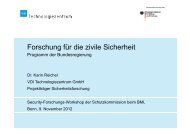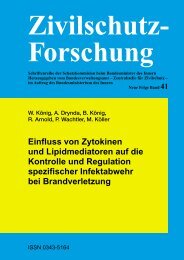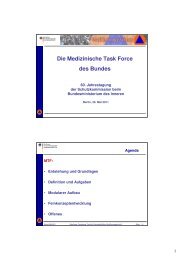- Seite 1 und 2: Zivilschutz- Forschung Schriftenrei
- Seite 4 und 5: Zivilschutz- Forschung Schriftenrei
- Seite 6 und 7: Inhaltsverzeichnis Zusammenfassung
- Seite 8 und 9: 9.3Verbesserung der katastrophenmed
- Seite 10 und 11: Einbindung des Öffentlichen Gesund
- Seite 12 und 13: Das Wissen, das für ein erfolgreic
- Seite 14 und 15: des ÖGD in die Katastrophenmedizin
- Seite 16 und 17: geringem Umfang. Die Integration de
- Seite 18 und 19: in local district authorities, and
- Seite 22 und 23: 1. Current state of integration of
- Seite 24 und 25: As a structure for the organisation
- Seite 26 und 27: 1. Problemstellung „Krieg, Pestil
- Seite 28 und 29: Literatur [1] From the Center for D
- Seite 30 und 31: alarm; Schätzungen gehen von bis z
- Seite 32 und 33: Militärische und terroristische Be
- Seite 34 und 35: lebensnotwendige Versorgung zahlrei
- Seite 36 und 37: Ministerien und Behörden wahrgenom
- Seite 38 und 39: 2.3.2 Katastrophenschutzstab und zu
- Seite 40 und 41: spezifischen Fachkenntnissen zusamm
- Seite 42 und 43: • Durcharbeitung des Katastrophen
- Seite 44 und 45: [14] Dennis C: The bugs of war. Nat
- Seite 46 und 47: [39] Knuth P: Die katastrophenmediz
- Seite 48 und 49: Ergibt somit eine Sichtung und Anal
- Seite 50 und 51: An dieser Stelle sei wenigstens and
- Seite 52 und 53: ihm insoweit zugestandene Fachkompe
- Seite 54 und 55: FAZIT Zusammenfassend bleibt festzu
- Seite 56 und 57: Art. 3 Abs. 1 Nrn. 3 und 4: Kreisve
- Seite 58 und 59: RDG Im RDG finden sich keine Regelu
- Seite 60 und 61: LKGBbg § 9 Abs. 1 Satz 1: Verpflic
- Seite 62 und 63: der gesetzanwendenden Verwaltung de
- Seite 64 und 65: Die den Gesundheitsämtern nach §
- Seite 66 und 67: § 4 Abs. 2 zeigt zwar eine gewisse
- Seite 68 und 69: Gesundheitsfragen beteiligter Stell
- Seite 70 und 71:
Gesundheitsdienstgesetz. Deshalb is
- Seite 72 und 73:
Insofern impliziert § 1 Abs. 3 FSH
- Seite 74 und 75:
allein nach dem Gesundheitsdatensch
- Seite 76 und 77:
LBKG, wo die Zusammensetzung des La
- Seite 78 und 79:
in Krankenhäusern (§ 12 Abs. 1 Nr
- Seite 80 und 81:
Abs. 1 und 2 ÖGdG Rh.-Pf., s. dort
- Seite 82 und 83:
1 Satz 2 ist nur beispielhaft) nich
- Seite 84 und 85:
Nach § 5 Abs. 1 hat die KatS-Behö
- Seite 86 und 87:
terne Zuständigkeitsregelungen (vg
- Seite 88 und 89:
RDG Das Gesetz enthält kaum - zumi
- Seite 90 und 91:
gene, nicht katastrophenfallspezifi
- Seite 92 und 93:
3.3 Synoptische Auflistung der eins
- Seite 94 und 95:
3.4 Schlussbetrachtung Die Analyse
- Seite 96 und 97:
zeslücken mit den Mitteln methodis
- Seite 98 und 99:
Anforderungen an den Arzt im ÖGD b
- Seite 100 und 101:
Bei Chemieunfällen oder Freisetzun
- Seite 102 und 103:
GRUNDLAGEN der RADIOLOGIE Physikali
- Seite 104 und 105:
PÄDIATRIE Infektionskrankheiten Ep
- Seite 106 und 107:
HYGIENE Individualhygiene, Umwelthy
- Seite 108 und 109:
Akute Funktionsstörungen des ZNS -
- Seite 110 und 111:
PRAKTISCHE WEITERBILDUNGSZEITEN - 3
- Seite 112 und 113:
dizinische Themen oder direktes org
- Seite 114 und 115:
• Einbindung und Aufgaben des öf
- Seite 116 und 117:
2. Fachseminare Zivilschutz/Selbsts
- Seite 118 und 119:
Leiter von Führungsgremien, Mitarb
- Seite 120 und 121:
Berater für Sanitäts-/Gesundheits
- Seite 122 und 123:
des Bildungsfreistellungs- und Qual
- Seite 124 und 125:
3. Semester: Biostatistik, Epidemio
- Seite 126 und 127:
4.3 Nicht-ärztliches Personal In E
- Seite 128 und 129:
Lehrgang zum Lebensmittelkontrolleu
- Seite 130 und 131:
Lehrgang zum Lebensmittel-Überwach
- Seite 132 und 133:
Abb. 3 Inhalte der Ausbildung zum G
- Seite 134 und 135:
Führungskräfte im ABC-Schutz mit
- Seite 136 und 137:
Fazit Bei der Gegenüberstellung vo
- Seite 138 und 139:
Literatur [1] Femmer HJ, Mais H: Ka
- Seite 140 und 141:
zererstr. 9, 80797 München, Gedruc
- Seite 142 und 143:
Die Auswertung der zurückgesandten
- Seite 144 und 145:
den, setzt sich hauptsächlich aus
- Seite 146 und 147:
Abb. 3 Anzahl der Ärzte im ÖGD, d
- Seite 148 und 149:
Abb. 6 Praktische Erfahrungen im Ma
- Seite 150 und 151:
gegen sehr unterschiedlich beurteil
- Seite 152 und 153:
phylaxe als auch in der Bekämpfung
- Seite 154 und 155:
für katastrophenmedizinische Fortb
- Seite 156 und 157:
Abb. 17 Gewünschte Inhalte katastr
- Seite 158 und 159:
Mitarbeit in beratender Funktion im
- Seite 160 und 161:
im Rahmen ihrer Facharztweiterbildu
- Seite 162 und 163:
5. Schwierigkeiten, die bei der pra
- Seite 164 und 165:
[16] Vested P: The significance of
- Seite 166 und 167:
6. Evaluation der unteren Katastrop
- Seite 168 und 169:
Abb. 1 Prozentsatz auswertbarer Umf
- Seite 170 und 171:
6.2.2 Aktueller Stand der Integrati
- Seite 172 und 173:
zu einer verbindlichen Organisation
- Seite 174 und 175:
ei der Bearbeitung katastrophenmedi
- Seite 176 und 177:
tragten Informationen zu Symptomen,
- Seite 178 und 179:
Abb. 10 Wunsch der Katastrophenschu
- Seite 180 und 181:
Abb. 13 Wunsch der Katastrophenschu
- Seite 182 und 183:
ehörden und dem ärztlichen Person
- Seite 184 und 185:
Übungen wie in Planspielen zu nenn
- Seite 186 und 187:
186 Fazit 1. Aktuell ist die Einbez
- Seite 188 und 189:
[14] Bartels F: Katastrophenmedizin
- Seite 190 und 191:
7. Evaluation der Einbindung der Ä
- Seite 192 und 193:
die Rücksendung der Fragebögen an
- Seite 194 und 195:
strophensituationen, die durch die
- Seite 196 und 197:
Abb. 5 Beteiligung und Position der
- Seite 198 und 199:
Die Analyse des Verhaltens der Ärz
- Seite 200 und 201:
Literatur [1] From the Center for D
- Seite 202 und 203:
8. Die Funktion der im Öffentliche
- Seite 204 und 205:
Abb. 2 Stellung des Arztes im Öffe
- Seite 206 und 207:
ordnet in der Regel die nötigen Ma
- Seite 208 und 209:
wehr oder noch so ausgeklügelte Al
- Seite 210 und 211:
9. Konzepte zur verbesserten katast
- Seite 212 und 213:
wesen (ÖGW) eingehender vermittelt
- Seite 214 und 215:
Lehrinhalt Ziel Definitionen Massen
- Seite 216 und 217:
Lernabschnitt 3: Organisation der K
- Seite 218 und 219:
Die eingehende Vermittlung von spez
- Seite 220 und 221:
Lehrinhalt Ziel zeitl. Umfang n. Re
- Seite 222 und 223:
9.5 Erweiterte Angebote 9.5.1 Angeb
- Seite 224 und 225:
Kommentar: Die Akademie für Krisen
- Seite 226 und 227:
Literatur [1] Delooz H, Della Corte
- Seite 228 und 229:
10. Konzepte zur Erweiterung der Sa
- Seite 230 und 231:
Abb. 2 Modelle zur Erweiterung der
- Seite 232 und 233:
mittelnden Wissens und von den Anst
- Seite 234 und 235:
Allgemeine Abwehr von Schadensereig
- Seite 236 und 237:
Abb. 6 Mögliche Komponenten im kon
- Seite 238 und 239:
unseres konzeptionellen Entwurfs f
- Seite 240 und 241:
10.3.2 Exemplarische Beurteilung vo
- Seite 242 und 243:
- Strahlenschutzüberwachung von Pe
- Seite 244 und 245:
Kommentar: Die RSZ verfügen zwar
- Seite 246 und 247:
Als lebensbedrohliche hochkontagiö
- Seite 248 und 249:
Das Bernhard-Nocht-Institut (BNI) f
- Seite 250 und 251:
Kommentar: Die bisherige Arbeit der
- Seite 252 und 253:
Entsprechend der Fachkonzeption des
- Seite 254 und 255:
Kriterium Robert-Koch-Institut Bund
- Seite 256 und 257:
Transport-Unfall-Informations- und
- Seite 258 und 259:
Bewertung Nach den von uns skizzier
- Seite 260 und 261:
- Nachhaltigkeit in der Etablierung
- Seite 262 und 263:
[4] Curio F: Curio F: Zivil- und Ka
- Seite 264 und 265:
Anhang - Adressliste Wissens- und K
- Seite 266 und 267:
Zentren bei Auftreten von Seuchen u
- Seite 268 und 269:
268 Bonn: Erfurt: Freiburg: Informa
- Seite 270 und 271:
11. Schlussfolgerungen • Nach Ana
- Seite 272 und 273:
Teil I: Zu Ihren notfallmedizinisch
- Seite 274 und 275:
� Sicherheit und Technik als �
- Seite 276 und 277:
II.8 Ihre Kenntnisse hinsichtlich d
- Seite 278 und 279:
� Einsatztaktik und Zusammenarbei
- Seite 280 und 281:
4.) In welchen Situationen ist das
- Seite 282 und 283:
7.) Besteht Ihrer Meinung nach weit
- Seite 284 und 285:
Band 44 E. Pfenninger, D. Hauber Me
- Seite 286 und 287:
Band 12 Biologische Dosimetrie I.-












